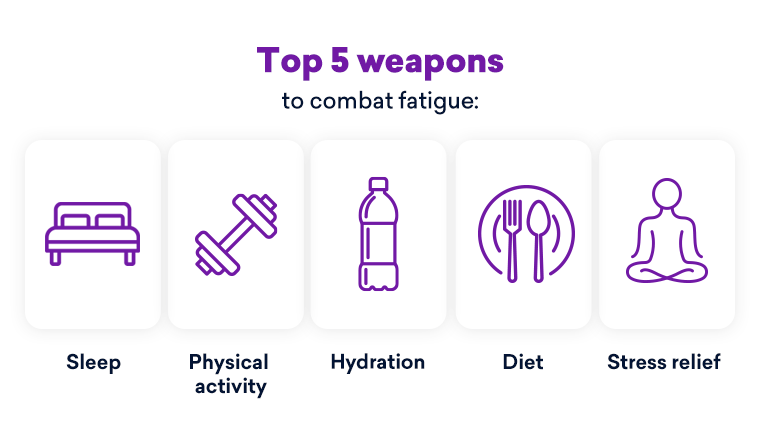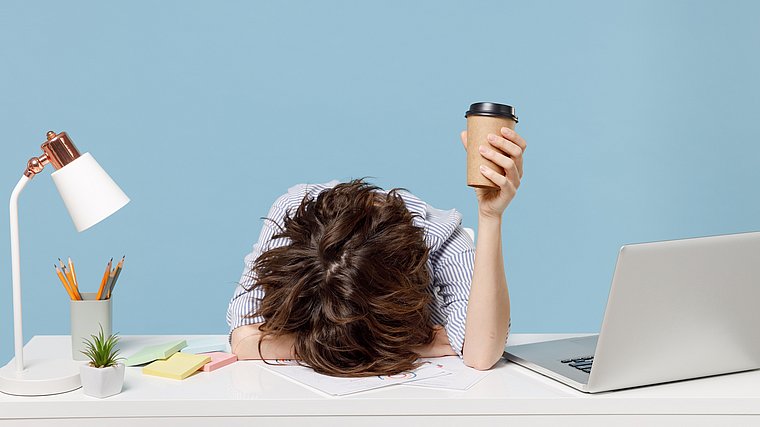Celebrating birthdays together, throwing Christmas and Easter office parties, or having doughnuts on ‘Fat Thursday’ – such workplace traditions are so people-friendly and popular that we tend to see nothing but advantages in them. This also applies to the financial aspect. There are plenty of reports on why and how to incorporate, for example, Fat Thursday festivities, into business costs as a bonus to increase employee loyalty [1]. However, it doesn’t take a scientific study to figure out how a massive dose of carbohydrates affects the team. After a short-lived sugar high, drowsiness sets in and work performance drops, often down to zero. Of course, this is no reason to give up good employee engagement practices altogether. But what if the problem occurs again and again? Or even every day?
Afternoon slump, or a midday dip in energy and focus, is a fairly common phenomenon. Work productivity is the highest early during the working day. Then, it naturally declines, hitting a low point between 1 pm and 3 pm. This is the time when we tend to feel sluggish and distracted. The natural energy dip becomes an issue when it increases to an extent that hampers work engagement... or occurs every day, and becomes excessive. What could be the underlying reasons?
Fatigue is not the only problem. During the afternoon slump, many people also suffer headaches, muscle weakness, problems with vision, irritability, and sudden cravings for sweet treats. If these symptoms grow severe, they may affect not only performance at work, but also relationships within the team and healthy eating habits [2].
Common causes of mid-afternoon energy slump
- Insufficient amount of sleep
According to last year’s STADA Health Report, 57% of Poles use sleep medications [3]. Why? The same report shows that almost half of the Polish population (a staggering 47%!) worry about everyday events instead of relaxing. Sleep disturbances at night have a major adverse effect on the next day’s energy levels, which causes anxiety about work, ultimately resulting in a vicious circle of stress.
- Unhealthy eating habits
It’s no coincidence that Fat Thursday is mentioned here. It’s an unapologetic celebration of simple carbohydrates. Making things worse, they’re consumed on an ad hoc basis, without proper intervals between meals. Meanwhile, dietitians point directly to the link between a properly balanced diet (importantly, it also includes carbohydrates, as long as they’re consumed rationally), and dips in energy during the day . Studies conducted by the Health Enhancement Research Organization show that employees who regularly eat healthy meals are 25 percent more productive at work compared to people who don’t have a healthy eating routine [4].
- Poorly planned workout regime
Is exercise good for your health? Of course! But, like everything else, physical activity should be planned and pursued with common sense. For example, a morning workout may increase the release of cortisol, and the resulting stress impairs the quality of work [5]. Consequently, it’s better to discuss the exercise regime with a trainer after describing your individual daily routine and the nature of your work.
- Inadequate hydration
For every kilogram of body weight, people should consume approximately 0.02 liter of water. Consequently, an adult person should drink around 1.5 to 2 liters of water per day for optimal hydration. In hot weather, the volume increases up to 5 liters [6]. Unfortunately, we often forget about it in the hustle and bustle of daily life. The effects of dehydration come on in the afternoon, in the form of distraction and fatigue.
- Overwhelming stress
In addition to its adverse impact on sleep, stress interferes with productivity during the day. All too often, we focus on physiological aspects and, for example, mistakenly attribute drowsiness to digestion, while it’s actually due to the brain demanding a respite from stressors [7].
Did you know that... as many as 15% of Poles do not eat anything at all during their working day and more than 50% do not drink enough fluids [8, 9]? More information about the nutritional mistakes of Polish employees and ways to support them in their pursuit of healthy habits can be found HERE.

What can employers do to support their employees?
There are two types of solutions: educating and creating opportunities. Preferably, they should be combined to create one comprehensive health-supporting strategy.
What about coffee? Usually, the immediate solution that springs to mind to beat the slump is having an energy drink or a cup of coffee. However, remember that the recommended limit for coffee intake is four cups per day [10]. Also, fitting the office with a powerful coffee machine is not a magic fix to overcome the energy slump. It’s best to opt for other, healthier choices.
Manage fatigue in the workplace
In his Forbes article, Professor Christopher Barnes from Washington’s Foster School of Business, recommends incorporating natural energy dips into an appropriate work schedule [11]. This prevents situations where severe afternoon fatigue jeopardizes the performance of work tasks. For example, in the morning employees may be assigned duties that require a greater focus on creativity or more physical energy. The natural midday dip in alertness is a good time for activities that don’t require a creative approach and ingenious ideas, such as organizing documents or having a meeting to review the progress of a project.
Introduce work breaks
Another useful tip is to integrate breaks into the workday. They don’t need to be work-free times, but can be designated for lighter tasks [7]. Ultimately, getting away from intensive work for a while improves performance from the perspective of the whole working day. It’s a good idea to take a short break by preparing printouts or delivering documents to another department. Such activities pull you away from the tasks at hand and allow you to move around a bit. Another opportunity to take a breather while working is to hold a brainstorming meeting, especially when the team is involved primarily in carrying out analyses or other tasks requiring undivided attention.
Share knowledge
Are you concerned that you have neither the time nor the knowledge to provide employees with appropriate healthy lifestyle advice? You don’t need to rely on the internal resources. You may dip into external services such as the Diet Creator offered by MultiLife. With this benefit, you can also provide employees with other solutions improving their mental and physical well-being, such as access to inspirational books or personal development courses.
Provide expert support
Webinars with specialists, in-office massage sessions, consultations with trainers and dietitians – these and other solutions raise employees’ awareness of health issues and contribute to improving their lifestyle habits (including diet), thus optimizing productivity.
Monitor your team
Frequent and excessive afternoon slumps may be explained by general fatigue. Consequently, employers are advised to make sure their team members take vacation days throughout the year in order to be properly rested [7].
Create a friendly space
Sometimes the afternoon slump may kick in because of the nature of the work environment. Noisy crowded spaces may increase stress levels, while poor ventilation contributes to a sharp decline in work performance. Sometimes a simple but effective way to beat the afternoon slump is opening the windows and letting in lots of fresh air [7].
Prioritize infrastructure
Introducing healthy eating habits will be easier if the company provides staff with an area where they can have a meal without any distractions, and easy access to drinking water across the office space. Keep in mind that a better way to boost your overall performance is proper hydration rather than a ‘life-saving’ cup of coffee [12].
Remember about physical activity
Exercise – both physical activity and breathing practice – is a great solution to bring your tired mind back to the game. Employees should be reassured about the importance of maintaining well-being at work in this way and, if possible, a separate space for exercise or relaxation should be allocated, where they can regain their work mojo [12].
As you can see, there’re plenty of ways that help to improve workforce efficiency, and they’re available practically at your fingertips. Keep in mind, though, that productivity is not, and can never be, constant throughout the work day, so let’s be understanding with each other and work in sync with our natural rhythm. In this way, working will be both effective and engaging.
References:
- https://bezprawnik.pl/paczki-dla-pracownikow-w-tlusty-czwartek/.
- https://www.liveabout.com/causes-of-afternoon-slump-3514765.
- https://www.stada.com/media/7248/20220810_stada_factsheet_sleep_engl_v02.pdf.
- https://zdrowie.pap.pl/dieta/dieta-ma-duzy-wplyw-na-wyniki-w-pracy.
- https://novumortopedia.pl/wydolnosc-w-roznych-porach-dnia/.
- https://pacjent.gov.pl/aktualnosc/pij-wiecej-wody.
- https://inewi.pl/Blog/spadek-energii-w-pracy-jak-z-nim-walczyc.
- https://www.portalspozywczy.pl/dookola-rynku/wiadomosci/badanie-co-polacy-jedza-w-pracy,143558.html.
- https://www.pulshr.pl/rynek-zdrowia/zdrowa-dieta-poprawia-produktywnosc-pracownicy-o-tym-zapominaja,77621.html.
- https://www.medonet.pl/zdrowie,organizm-daje-znac--ze-pijesz-za-duzo-kawy--nie-przegap-tych-sygnalow,artykul,10109285.html.
- https://www.forbes.pl/kariera/nie-unikniesz-spadkow-energii-zacznij-planowac/hmtzl6x.
- https://poradnikpracownika.pl/-spadek-energii-w-pracy-jak-go-pokonac.
- https://portal.abczdrowie.pl/wyniszcza-jelita-doprowadza-do-problemow-psychicznych-polacy-maja-ogromny-problem.
- https://analitykadietetyczna.pl/dlaczego-wystepuje-spadek-energii-po-poludniu/.
